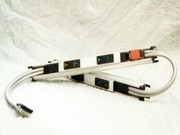TBOX
TBOX's modular design makes installation and reconfiguration a snap. All components are easily interchangeable; circuit usage, TBOX placement, and power entry options are easily changed to meet your needs with a minimum of work. TBOX consists of just three basic parts (Power Entry, TBOX, and Cables) that install quickly and easily without tools. Three basic parts simplify installation and keep inventory at a minimum.
By limiting shared neutrals to two lines per neutral, TBOX eliminates the problem of harmonics. An Underwriter's Laboratories study indicated that three 20 amp lines can load up to 35 amps on a shared neutral. The same study shows that two 20 amp lines can only load 28 amps on a shared neutral.
TBOX has an exclusive safety feature that overwhelms all of the otherwise exciting and innovative product details. No component, combination of components, or cluster of stations can be energized from more than one source of supply. Overcurrent protectors cannot accidentally aggregate in the panel box. Although power can be carried in all directions, the unique feature does not allow every mechanically connected panel to be electrically connected. Directional Power prevents inadvertent interconnection of multiple power entry cables. Underwriters Laboratories, Inc. and the Canadian Standards Association require nondirectional power packages to carry a warning label as follows:

TBOX is exempt from the warning label. It prevents multiple power supply. Multiple power supply rarely happens in the original installation because the warning is on the power entry cable. It happens during reconfiguration. The illustration below shows how added work stations align circuit breakers in a panel box and move the 20 ampere safety fuse threshold to 100 amperes or more. The single neutral wire in panel wiring is also forced to carry the elevated imbalance with no breaker at all. To download a warning sheet outlining the dangers of multiple power supply, click here.
TBOX has been granted approvals by Underwriter's Laboratories (UR), Canadian Standards Association (CSA), Electrical Testing Laboratories (ETL), and The City of Los Angeles.
Pass Through Cables carry power through non-powered panels. These cables are more cost effective than placing tracks without receptacles for continued power. Pass Through Cables are modular to panel size; one size works through all panel junctions.
Longer TBOXes are able to hold 4 or more duplexes per side. That means that fewer panels need be powered, fewer tracks, and greater savings.
The unique tracking area allows one universal cable length to serve as a panel to panel, adjacent panel, inside corner, and outside corner connection. One cable length does it all.
TBOX's vast variety of power entry options can accommodate nearly every power entry scenario. Ceiling feeds and end panel feeds are but a few of the options available.
TBOX's branching feature provides areas to reverse direction and carry power in all branches of X, T, or Y configurations. The branching feature is easier to plan and connect than left and right connector cables.
